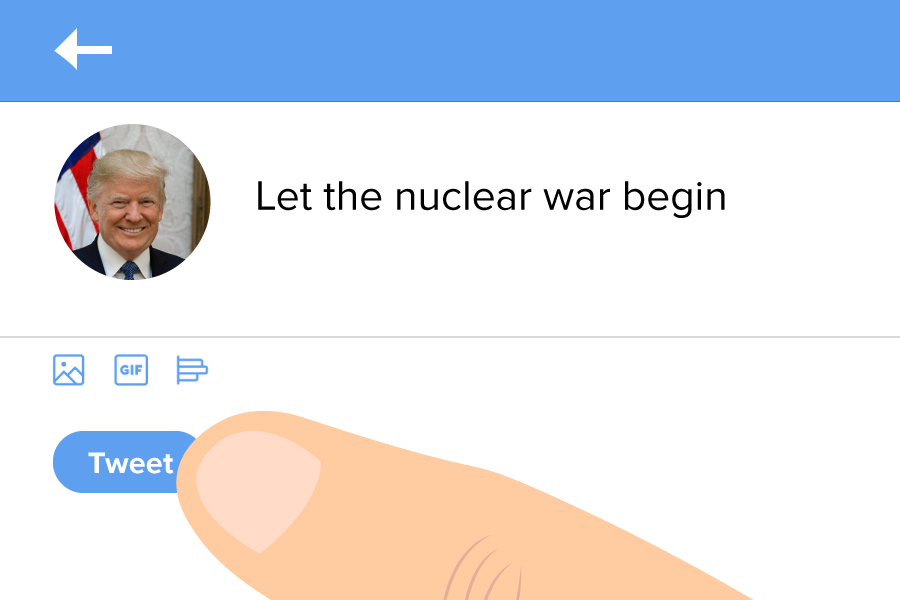
Diplomacy in the digital age
Donald Trump is undoubtedly the first President of the United States to use Twitter as a form of diplomacy. That is, if you can call it that. For the past two years, Trump has made headlines with his bullying tactics on social media, featuring absurd nicknames, uninformed rants and accusations of “fake news.” In particular, the summer of 2017 was met with an unusual Twitter battle between Trump and a trigger-happy Kim Jong Un, who declared that his country had ballistic missiles that could potentially reach the United States. Trump’s unusual propensity toward name-calling reached its zenith with his public condemnation of Kim as a “little rocket man.” The mockery, which outraged some — many people even believed that the two countries could be on the verge of nuclear war — has had a curious effect on American-Korean relations.
Trump is planning a meeting with Kim this May, according to the White House, although Press Secretary Sarah Huckabee Sanders has assured news outlets that the sanctions will continue unless Kim agrees to denuclearization. The meeting of Trump and Kim would be historic, not only for Trump’s presidency, but for the world; no American leader has met or even had a telephone call with the notoriously volatile Kim.
But then Trump is volatile, too. Curiously, their equally belligerent approach seems to have brought about a possible détente between the United States and North Korea. Moreover, North and South Korea have engaged in peace talks. Proponents of Trump’s aggressive and isolationist foreign policy have argued that his hard-line approach has been one of the main instigators for the possible rapprochement between the historic enemies. Kim may be embarrassed about the state of his country — there is significant evidence to support the fact that many North Koreans are starving. Meanwhile, South Korean leaders may be inclined to bury the hatchet with their old rival to demonstrate their commitment to peace in the region and to enhance their own status on the Asian continent. Some people have even gone so far as to suggest that Trump should win the Nobel Peace Prize.
Regardless of this, however, let’s not forget that much of Trump’s success with Kim is circumstantial. Moreover, as some of Trump’s critics have suggested, the President’s decision to enter peace talks with North Korea may imply that the U.S. recognizes it as a legitimate nuclear power. This would send the wrong message entirely to North Korea and would perhaps encourage more volatile behavior on the part of Kim.
In my column, I’ve often written about the way that technology and social media influence the American electorate, and I feel it’s important to address the role of Twitter in the tentative North Korea-South Korea rapprochement. Trump is a notorious bully and has no compunction when it comes to venting his spleen about opponents on Twitter. Paradoxically, however, this approach has been remarkably effective. The more Trump continued to condemn “fake news” outlets — i.e., liberal news media like CNN and The New York Times — the harsher the criticism he received from these newspapers. The criticism not only inadvertently popularized him but also enhanced the rhetoric of victimhood and self-aggrandizing that Trump employed.
Trump used the same tactic with North Korea that he did with the United States itself. By participating in a Twitter war with one of the most dangerous world leaders in recent history, he received exactly what he wanted; for Trump, any publicity is good publicity. In turn, the boyish online battle that ensued between the two leaders was further proof of North Korea’s belligerence — just as Trump wished. The embarrassment that this caused for North Korean diplomats may have brought about their purported wish to broker peace with South Korea and initiate potential diplomatic relations with the United States. After all, their authoritarian leader had been openly and ruthlessly criticized by a rival western power. Whether this actually spurred the North Koreans to positive diplomatic action remains a mystery, however. It is unlikely that we will know just what pushed Kim to introduce the long-elusive possibility of peace with his country’s arch rival, the South.
What we do know is that both Trump’s campaign and his foreign policy have thrived from his verbal and online recklessness. Indeed, Twitter is ideal for both Trump and Kim: it’s a playground for political bullies like themselves who are willing to push their agendas at any cost.
Written by: Rebecca Bihn-Wallace — rlbihnwallace@ucdavis.edu
Disclaimer: The views and opinions expressed by individual columnists belong to the columnists alone and do not necessarily indicate the views and opinions held by The California Aggie.




